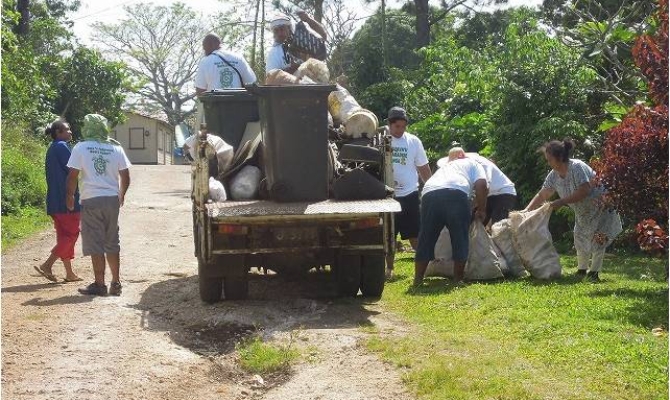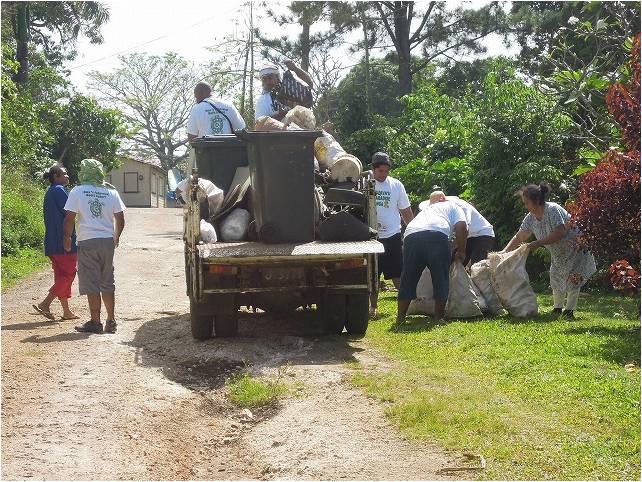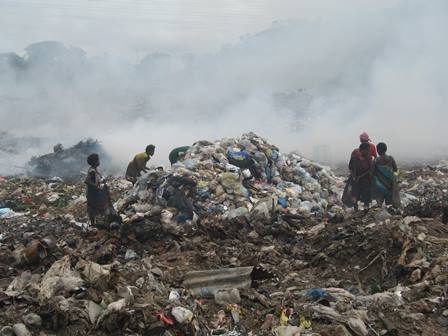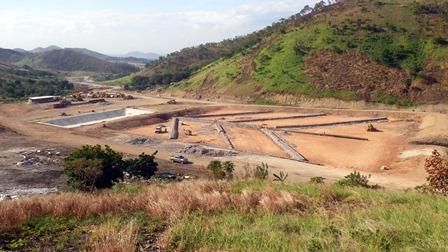
Waste Management and Pollution Control
The Japanese International Cooperation Agency (JICA) completed the five-year J-PRISM (Japanese Technical Cooperation for Promotion of Regional Initiative on Solid Waste Management in Pacific Island Countries) project at the end of January.
The J-PRISM project, a region-wide technical cooperation project, was committed to tackling the issues of solid waste management unique to island countries for 11 Pacific states in close collaboration with the Secretariat of the Pacific Regional Environment Programme (SPREP).
The J-PRISM project, a region-wide technical cooperation project, was committed to tackling the issues of solid waste management unique to island countries for 11 Pacific states in close collaboration with the Secretariat of the Pacific Regional Environment Programme (SPREP).
 Community garbage collection system Vava'u, Tonga
Community garbage collection system Vava'u, TongaAt the inception of the project, some of the solid waste problems in the Pacific region included increasing and diversifying solid waste due to a changing lifestyle and concentration of the population in urban areas.
Some island nations had difficulty in securing the land for final disposal sites because of very limited space. Solid waste was accumulating on some islands because of their geographical remoteness, and uneconomical recycling operations.
The impact of solid waste on the natural environment including coral reefs and mangrove forests due to poor management of hazardous waste and improper control of final disposal sites was also a problem the J-PRISM project sought to address.
J-PRISM also sought to address the issue of waste generated by natural disasters, which can be quite significant in the Pacific given its' vulnerability to climate change, including intensified cyclones, flooding and drought.
The JICA team's emphasis for the J-PRISM project was to help develop the individual and institutional capacities, improve solid waste management across the 11 countries. J-PRISM also helped create recycling oriented societies, foster cooperation at the grassroots level and participate in south-south cooperation, and intraregional cooperation in collaboration with all stakeholders including SPREP, UN organisations and other donors.
All the 11 countries supported by J-PRISM reported successes in their own priority areas of the J-PRISM project as outlined in a J-PRISM newsletter.
In the area of Capacity Development, Ms Vivianne Morofa from Papua New Guinea reported that project counterparts have acquired research skills in waste management by undertaking Time and Motion Studies and Waste Charactisations since 2011.
All the 11 countries supported by J-PRISM reported successes in their own priority areas of the J-PRISM project as outlined in a J-PRISM newsletter.
In the area of Capacity Development, Ms Vivianne Morofa from Papua New Guinea reported that project counterparts have acquired research skills in waste management by undertaking Time and Motion Studies and Waste Charactisations since 2011.
 Baruni landfill 2011 Papua New Guinea
Baruni landfill 2011 Papua New Guinea"With technical assistance form J-PRISM, and collaboration of the Chuuk State Division of Public Works, we have rehabilitated the dumpsite, improved an access road to the dumpsite, and set up a garbage collection on the island of Weno," said Mr. Jack Sham from the Federated States of Micronesia, when commenting on improvements on the ground.
In creating a recycling-oriented society, Mr. Shalend Singh from Lautoka City Council in Fiji said that they are proud to have initiated the home compost subsidy program, market waste composting, green waste chipping, clean schools program, rehabilitation of disposal sites and recyclable collection service under the guidance of JICA experts.
Cooperation at the grassroots level was enhanced in Tonga by the JICA Partnership Program. Mr. Hiroshi Kogachi from the Okinawa Citizens Recycle Movement reported witnessing the wave of large consumption flowing into the country, ranging from disposable diapers to automobiles.
"Fortunately, I was able to meet a recycle business operator and young people who respected ties within a community. They are our precious partners in creating a recycling-oriented society," said Mr. Kogachi.
In developing the South-South cooperation and intraregional cooperation, a Pacific Islands Database of Capacity Development Activities (PIDOC), has been built within SPREP where the J-PRISM offices are located.
"We are sure that JICA and SPREP will continue working together now that we are collaborating on the development of the PIDOC database of local experts and trainers that can facilitate others in the development of human resources for leadership in solid waste management in the Pacific region," said the Director General of SPREP, Mr. Kosi Latu.
At the end of the project, the Chief Advisor for J-PRISM, Mr. Shiro Amano, said, "During the project, J-PRISM has provided quite a number of opportunities for the 11 countries to expose themselves to other people who have various expertise from different countries in solid waste management and capacity development."
"You now have a good knowledge of who can do what and who knows what. A significant number of interconnections have been established. If you further expand this network and deepen the interconnections among the Pacific in the future then you will be able to help yourself in a sustainable manner," added Mr. Amano.
"You now have a good knowledge of who can do what and who knows what. A significant number of interconnections have been established. If you further expand this network and deepen the interconnections among the Pacific in the future then you will be able to help yourself in a sustainable manner," added Mr. Amano.
 Baruni landfill 2015 Papua New Guinea
Baruni landfill 2015 Papua New GuineaThe J-PRISM Assistant Chief Advisor, Mr. Faafetai Sagapolutele commented, "We have done and learnt a lot from this project and I am confident that our island environments and people have gained a lot from the progress made by everyone's hard work, commitment and great effort."
"Whatever lessons and experiences gained from this project, let's use it for the betterment of our Pacific islands and people in the future," he concluded.
The J-PRISM project ended in January 2016, with a transition period from February to September 2016, where the team will complete their follow-up reports and begin planning for the second five-year phase of J-PRISM which begins in October 2016.